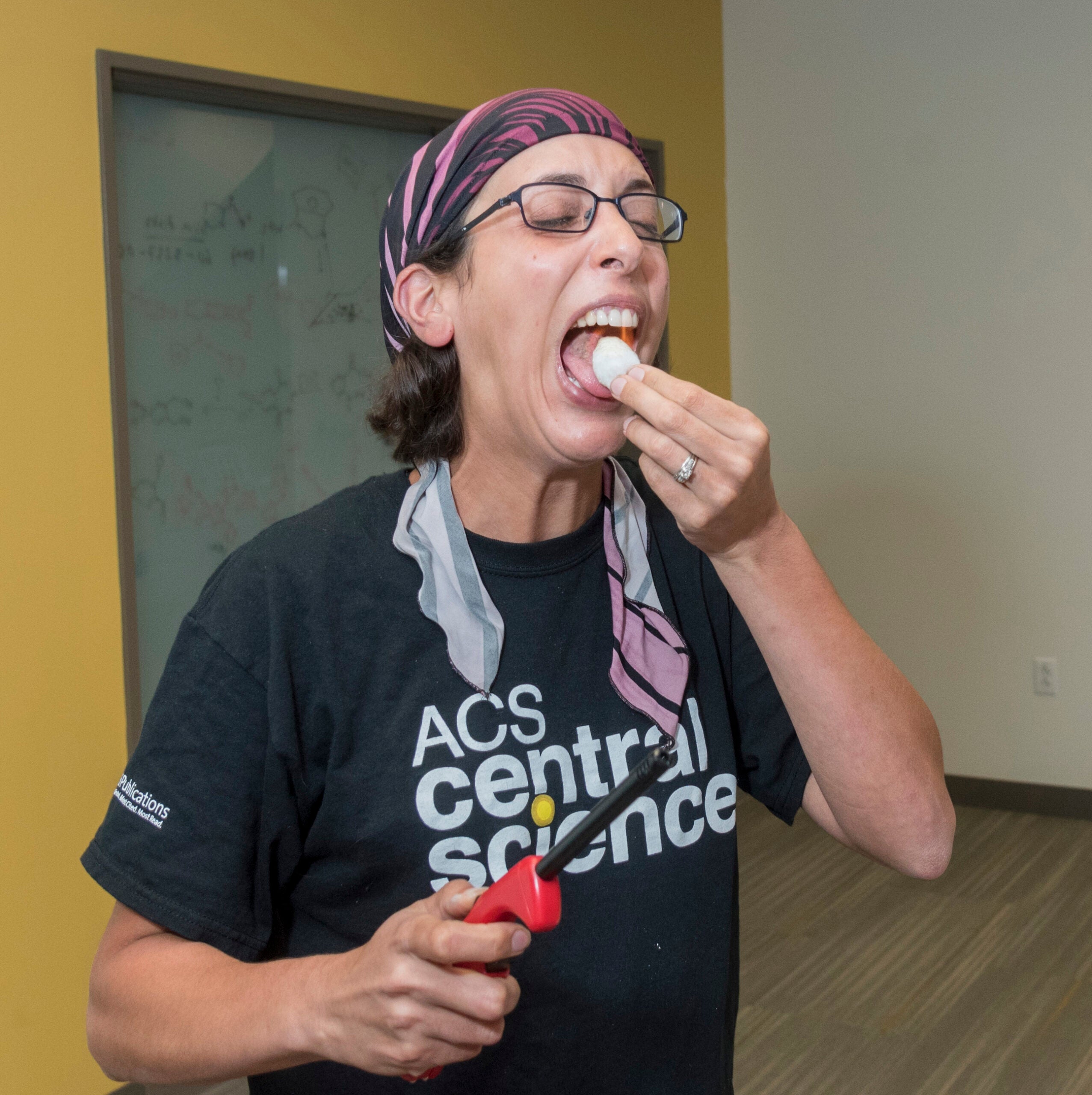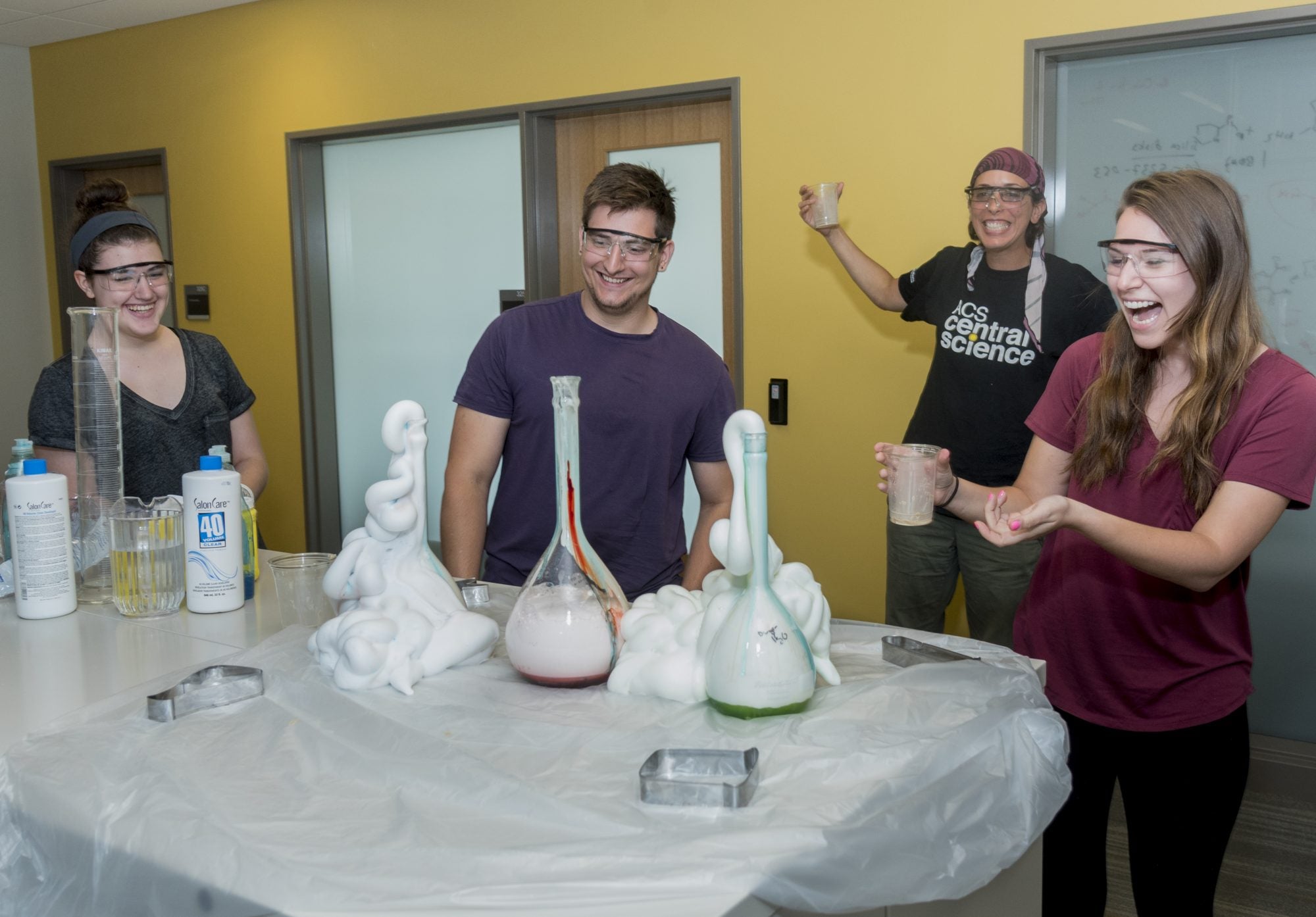KINGSTON, R.I., July 3, 2017 – Move over, Bozo.
A chemistry professor and her students at the University of Rhode Island have launched a business to entertain youngsters during birthday parties—and show them how much fun science can be.
Mindy Levine, a chemistry research professor, and graduate students Dana DiScenza and Benjamin Cromwell started Party Elements to inspire children to get excited about science and consider studying the field in college and beyond.
“Science is fun enough to be the life of the party,” says Levine. “It’s our goal to spread the message to as many young people as we can. That’s the best time to reach them.”
So far, the reviews have been great. “Mindy Levine is truly fantastic. Such a great role model for aspiring young scientists,’’ says one happy parent on the group’s Facebook page. “There’s no party like a Party Elements party,” says another.
Each party, which costs $200 and lasts nearly two hours, includes two hands-on activities and a short demonstration, as well as the option of making liquid nitrogen ice cream, which is edible.
Kids can look forward to making floam (a shaving cream-based slime); experimenting with textures and colors using a variety of materials; sticking wooden skewers through balloons without popping them; and creating pipe cleaner scaffolds for square bubbles. (The group brings a tarp for the floor to catch spills.)

Levine has also wowed guests by making “elephant toothpaste” (a combination of yeast, hair bleach, dish soap and food coloring), and extinguishing flaming cotton balls in her mouth, a feat she has mastered.
“The worst burn I’ve gotten is the feeling you get when you burn your tongue with hot soup,” says Levine. “And that’s not bad.”
The program leaves youngsters mesmerized. “Kids say it’s the coolest thing ever,” says Levine. “And, honestly, it is. Science is cool.”
The group is expanding into adult parties and has recently started offering cocktails that change color as they are poured into glasses (a lesson in acid-base chemistry), as well as drinks that form a perfect rainbow (a lesson in density).
Eventually, the group would like to go national. Levine has already been in touch with graduate students studying chemistry from other colleges who want to host parties in their towns.
“I think the potential is really high,” says Levine. “We want this to grow into a major business.”
The trio has a five-year business plan, thanks to DiScenza, of Pomona, N.Y., who will receive her master of business administration in December and her doctorate in chemistry in 2018. The plan includes a marketing strategy, financial projections and goals for expansion.
“I’m learning so much,” says DiScenza, who came up with the company’s name, a play off the periodic table of chemical elements. “I’m applying pretty much everything I learned in my classes.”
Cromwell’s expertise is planning the experiments, which require weeks of practice before unveiling them at fests. A Stoughton, Mass., resident, Cromwell will get his doctorate in chemistry in 2021.
“It’s great to see kids get excited about science,” he says. “The more people who can get interested in science, especially at a young age, the more scientists we’ll have in the world, and that’s important.”
Levine agrees: People need to know about science to be responsible citizens, she says, and make decisions about timely issues, from climate change to responsible vaccinations.
Party Elements grew out of Levine’s success with two female-specific and popular outreach programs she offers—Sugar Science Day, where students use sugar in experiments, and Chemistry Camp, a weeklong program where middle school girls study the chemistry of bubbles, lipstick chromatography and cornstarch relays.
Levine is a rising star in the world of chemistry—literally.
Two years ago, she won a Rising Star Award from the American Chemical Society for her contributions to chemistry. The Sharon, Mass., resident is an expert on synthetic organic chemistry, with a focus on how molecules communicate with each other when they are not attached. Her work can be used to develop tools for medical diagnostics and sensors for detecting toxins in the environment. She has received grants from the National Science Foundation and the National Cancer Institute, among others.
Party Elements is her latest passion. Word about the new business has spread around campus, and already professors, deans and staff are reserving dates. Winifred Brownell, dean of the College of Arts and Sciences, inquired whether the team would put on a show for her 2-year-old twin grandchildren.
“Sure,” says Levine. “Kids are naturally curious, and that’s what makes someone a good scientist. It’s never too early.”

